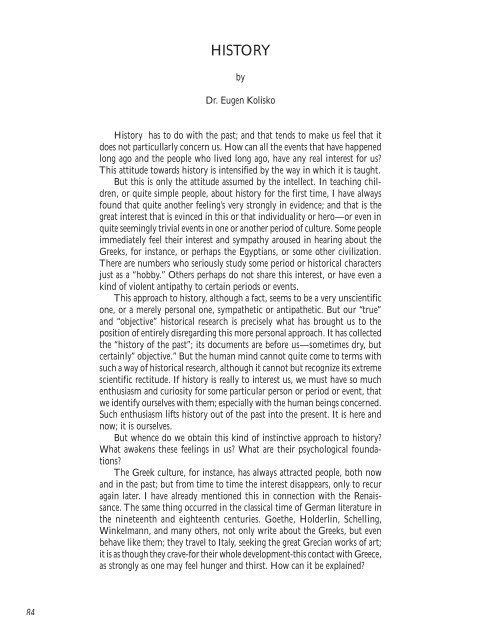Proceedings Colloquium on World History - Waldorf Research Institute
Proceedings Colloquium on World History - Waldorf Research Institute
Proceedings Colloquium on World History - Waldorf Research Institute
You also want an ePaper? Increase the reach of your titles
YUMPU automatically turns print PDFs into web optimized ePapers that Google loves.
HISTORY<br />
by<br />
Dr. Eugen Kolisko<br />
<strong>History</strong> has to do with the past; and that tends to make us feel that it<br />
does not particullarly c<strong>on</strong>cern us. How can all the events that have happened<br />
l<strong>on</strong>g ago and the people who lived l<strong>on</strong>g ago, have any real interest for us?<br />
This attitude towards history is intensified by the way in which it is taught.<br />
But this is <strong>on</strong>ly the attitude assumed by the intellect. In teaching children,<br />
or quite simple people, about history for the first time, I have always<br />
found that quite another feeling’s very str<strong>on</strong>gly in evidence; and that is the<br />
great interest that is evinced in this or that individuality or hero—or even in<br />
quite seemingly trivial events in <strong>on</strong>e or another period of culture. Some people<br />
immediately feel their interest and sympathy aroused in hearing about the<br />
Greeks, for instance, or perhaps the Egyptians, or some other civilizati<strong>on</strong>.<br />
There are numbers who seriously study some period or historical characters<br />
just as a “hobby.” Others perhaps do not share this interest, or have even a<br />
kind of violent antipathy to certain periods or events.<br />
This approach to history, although a fact, seems to be a very unscientific<br />
<strong>on</strong>e, or a merely pers<strong>on</strong>al <strong>on</strong>e, sympathetic or antipathetic. But our “true”<br />
and “objective” historical research is precisely what has brought us to the<br />
positi<strong>on</strong> of entirely disregarding this more pers<strong>on</strong>al approach. It has collected<br />
the “history of the past”; its documents are before us—sometimes dry, but<br />
certainly” objective.” But the human mind cannot quite come to terms with<br />
such a way of historical research, although it cannot but recognize its extreme<br />
scientific rectitude. If history is really to interest us, we must have so much<br />
enthusiasm and curiosity for some particular pers<strong>on</strong> or period or event, that<br />
we identify ourselves with them; especially with the human beings c<strong>on</strong>cerned.<br />
Such enthusiasm lifts history out of the past into the present. It is here and<br />
now; it is ourselves.<br />
But whence do we obtain this kind of instinctive approach to history?<br />
What awakens these feelings in us? What are their psychological foundati<strong>on</strong>s?<br />
The Greek culture, for instance, has always attracted people, both now<br />
and in the past; but from time to time the interest disappears, <strong>on</strong>ly to recur<br />
again later. I have already menti<strong>on</strong>ed this in c<strong>on</strong>necti<strong>on</strong> with the Renaissance.<br />
The same thing occurred in the classical time of German literature in<br />
the nineteenth and eighteenth centuries. Goethe, Holderlin, Schelling,<br />
Winkelmann, and many others, not <strong>on</strong>ly write about the Greeks, but even<br />
behave like them; they travel to Italy, seeking the great Grecian works of art;<br />
it is as though they crave-for their whole development-this c<strong>on</strong>tact with Greece,<br />
as str<strong>on</strong>gly as <strong>on</strong>e may feel hunger and thirst. How can it be explained?<br />
84
















